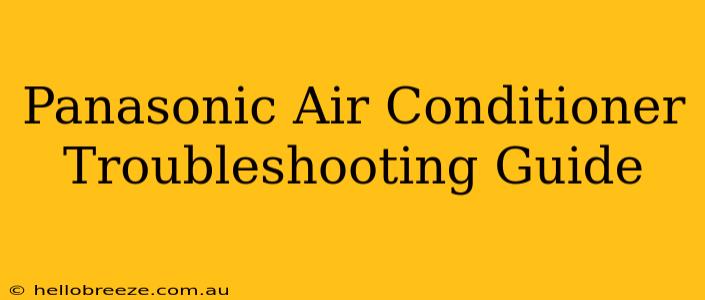Is your Panasonic air conditioner acting up? Don't sweat it! This comprehensive troubleshooting guide will help you diagnose and fix common problems, saving you time and money on costly repairs. We'll cover everything from simple fixes you can do yourself to when it's time to call a professional.
Common Panasonic Air Conditioner Problems & Solutions
This section dives into the most frequently reported issues with Panasonic air conditioners, providing clear, step-by-step solutions.
1. Air Conditioner Not Turning On
- Check the Power: This might seem obvious, but ensure the air conditioner is plugged in securely and the circuit breaker hasn't tripped. Check your home's electrical panel for any tripped breakers.
- Remote Control Batteries: Replace the batteries in your remote control. A simple battery change often solves the problem.
- Power Supply: Examine the power cord for any visible damage. If the cord is frayed or damaged, replace it immediately. Never attempt repairs on the power cord yourself.
- Filter Check: A clogged air filter restricts airflow and can prevent the unit from starting. Clean or replace the filter as needed (see our filter cleaning instructions below).
- Thermostat Settings: Double-check that the thermostat is set to the "cool" setting and is programmed to turn the unit on.
2. Air Conditioner Not Cooling Effectively
- Dirty Air Filter: A dirty filter significantly reduces cooling efficiency. Clean or replace the filter according to the manufacturer's recommendations.
- Frozen Evaporator Coil: This is a common problem that can occur due to restricted airflow, low refrigerant levels, or a dirty air filter. Turn off the unit and allow it to thaw completely before restarting. Call a technician if the problem persists.
- Refrigerant Leak: Low refrigerant levels will prevent your AC from cooling properly. A hissing sound or a noticeable lack of cool air suggests a refrigerant leak. Contact a qualified technician for repair.
- Clogged Condenser Coils: The condenser coils on the outside unit can become clogged with dirt and debris, reducing cooling efficiency. Clean the coils with a coil cleaning brush or a garden hose.
3. Air Conditioner Making Strange Noises
- Unusual Noises: Grinding, squealing, or rattling sounds often indicate a loose part or worn-out component. Contact a qualified technician to inspect and repair the unit.
- Compressor Issues: Unusual noises emanating from the compressor could point to serious problems. Immediate professional attention is required.
4. Air Conditioner Leaking Water
- Clogged Drain Line: Water leaks often result from a clogged condensate drain line. Locate the drain line and clear any blockages.
- Improper Installation: If the unit is not installed correctly, water may leak. Contact a qualified technician for inspection and repair.
Maintaining Your Panasonic Air Conditioner for Optimal Performance
Regular maintenance is crucial for extending the lifespan of your air conditioner and ensuring optimal performance.
Cleaning the Air Filter:
- Turn off the unit before cleaning.
- Carefully remove the air filter.
- Gently clean the filter using a vacuum cleaner or wash it with lukewarm water and mild detergent. Allow to dry completely before reinstalling.
- Replace the filter as needed; refer to your Panasonic air conditioner's manual for filter replacement frequency recommendations.
When to Call a Professional
While many minor issues can be addressed at home, it's crucial to know when to call a qualified Panasonic air conditioner technician:
- Refrigerant Leaks: Refrigerant leaks require specialized equipment and expertise.
- Compressor Problems: Compressor issues are complex and often necessitate professional intervention.
- Electrical Problems: Never attempt electrical repairs yourself; always call a professional.
- Persistent Problems: If you've tried troubleshooting the problem but are still experiencing issues, contact a technician for professional assistance.
By following this guide, you'll be better equipped to handle common Panasonic air conditioner problems. Remember, preventative maintenance is key to keeping your air conditioner running efficiently and effectively for years to come.

